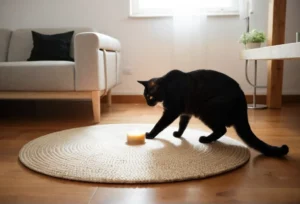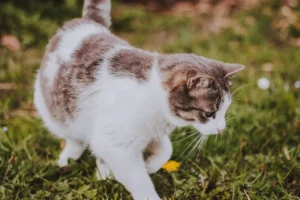Cats and bird feathers – it’s a common sight that leaves many pet owners puzzled. Why do cats eat bird feathers? Let’s unravel the mystery behind this behavior.
Cats have an innate hunting instinct that drives them to chase and catch prey, mimicking their wild ancestors. When cats eat bird feathers, it’s often a byproduct of their predatory behavior.
Instinctual Behavior: Exploring the Hunting Instinct
Cats have an innate hunting instinct that drives them to pursue small prey, such as birds. This behavior stems from their ancestors, who relied on hunting for survival. When cats catch birds, they may consume the feathers along with the rest of the prey. This instinctual behavior is deeply ingrained in cats and is often triggered by movement, size, and sound, making birds a prime target for them.
One interesting insight into cats’ hunting behavior is the importance of play in developing these skills. Kittens engage in play hunting with toys or each other, honing their stalking and pouncing abilities. This play mimics the hunting behaviors they would use to catch birds in the wild. So, when a cat eats bird feathers, it may be a result of their natural drive to hunt and capture prey.
Nutritional Needs: Understanding Dietary Reasons
While cats are obligate carnivores, meaning they need a diet primarily of meat to thrive, eating bird feathers is not typically for nutritional purposes. Feathers do not provide significant nutritional value for cats, as they are composed mostly of keratin – an indigestible protein.
However, there is a theory that eating small amounts of feathers may help cats expel hairballs. Feathers can act as roughage, aiding in the passage of hair through the digestive system. It is essential to ensure your cat’s diet is well-balanced and includes appropriate fiber sources to help prevent hairball formation and support overall digestive health.
In addition to their diet, it’s crucial to provide your cat with regular grooming to reduce the amount of fur they ingest during self-cleaning. This can help minimize the need for them to consume feathers or other indigestible materials to aid in digestion. If you notice your cat excessively consuming bird feathers or other non-food items, it’s best to consult with your veterinarian to rule out any underlying issues.
Playful Behavior: Examining Feline Curiosity
Cats are natural hunters, and their playful behavior often leads them to engage with bird feathers. When they come across these small, fluttering objects, their curiosity gets piqued, triggering their hunting instincts. Cats see feathers as potential prey, sparking their interest and prompting them to paw at or even chase after them.
This behavior is not necessarily harmful but can sometimes lead cats to ingest the feathers. While it may seem innocent at first, consuming bird feathers can pose risks to their health. Feathers are not easily digestible and can accumulate in the cat’s stomach, potentially causing blockages or digestive issues.
To prevent such problems, it’s essential to provide alternative toys and playthings for your cat that are safer for them to interact with. Opt for toys specifically designed for cats that mimic natural prey, such as feather wands or interactive catnip toys. By offering stimulating and safe alternatives, you can help satisfy your cat’s hunting instincts without putting their health at risk.
Health Implications: Addressing Potential Risks
While it may seem harmless for cats to play with and ingest bird feathers, there are potential health implications to consider. Feathers can be challenging for cats to digest due to their composition, leading to possible blockages or gastrointestinal issues. In severe cases, this could necessitate surgical intervention to remove the obstruction.
To safeguard your feline friend’s well-being, it’s crucial to monitor their interactions with feathers and intervene if necessary. If you notice your cat attempting to eat feathers or displaying symptoms of distress, such as vomiting or decreased appetite, seek veterinary care promptly. Your vet can provide guidance on the best course of action to ensure your cat’s health and safety.
Additionally, it’s advisable to keep bird feathers out of reach of your cat to prevent accidental ingestion. Securely store any feathered toys or accessories and supervise your cat’s playtime to minimize the risk of them consuming feathers. By being proactive and vigilant, you can help protect your cat from potential health risks associated with ingesting bird feathers.
Extra Tip: Consider incorporating a variety of engaging toys and activities into your cat’s routine to keep them mentally and physically stimulated. Rotation of toys can prevent boredom and reduce the likelihood of your cat fixating on potentially harmful objects like bird feathers.
Environmental Enrichment: Providing Alternatives
If your cat has a penchant for chowing down on bird feathers, fear not – there are ways to steer them towards more cat-friendly activities. One purr-fect solution is to offer a variety of engaging toys that mimic the thrill of hunting without the unfortunate avian consequences. Think feather wands, interactive puzzles, or even a simple cardboard box for some stealthy pouncing action. By providing these enticing alternatives, you can redirect your feline friend’s focus to more suitable outlets for their natural instincts. Remember, a happy cat means a happy home!
Vet Recommendations: Seeking Professional Advice
While the occasional feather snack may not be cause for alarm, excessive consumption can lead to digestive issues or pose a choking hazard for your furry companion. If you observe a persistent interest in bird feathers, it’s wise to consult with a veterinarian for expert guidance. A thorough check-up can rule out any underlying health concerns and help you devise a tailored plan to address your cat’s behavior effectively. Your vet is your ally in ensuring the well-being of your pet, so don’t hesitate to reach out for tailored advice and support.
Helpful Resource: For more insights on feline dietary habits and potential health risks related to feather consumption, consider exploring the American Association of Feline Practitioners website: AAFPCatHealth.org
Conclusion: Encouraging Safe and Healthy Habits
Cats eating bird feathers may seem like a harmless behavior, but it can pose risks to their health. Feathers can cause intestinal blockages or lead to infections if ingested. To prevent this, it’s crucial to create a safe environment for your feline friend. Keep bird feathers out of reach and provide alternative toys or objects for them to play with. Additionally, ensure your cat’s diet is rich in nutrients to discourage this behavior.
One unique angle to consider is providing your cat with interactive toys that mimic bird-like movements. This can satisfy their hunting instincts without the need to consume feathers. Consider investing in feather wands or automated toys to keep your cat engaged and entertained.
Remember, your cat’s well-being is in your hands. By taking proactive steps to discourage feather consumption and promote healthy habits, you can ensure a happy and thriving feline companion. Prioritize their safety and health by creating a nurturing environment tailored to their needs. Your furry friend will thank you for it!
Alex, a passionate animal lover, has experience in training and understanding animal behavior. As a proud pet parent to two dogs and three cats, he founded AnimalReport.net to share insights from animal experts and expand his knowledge of the animal kingdom.




